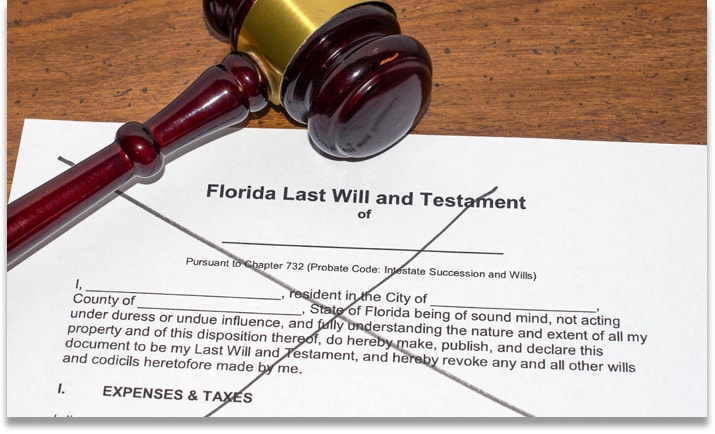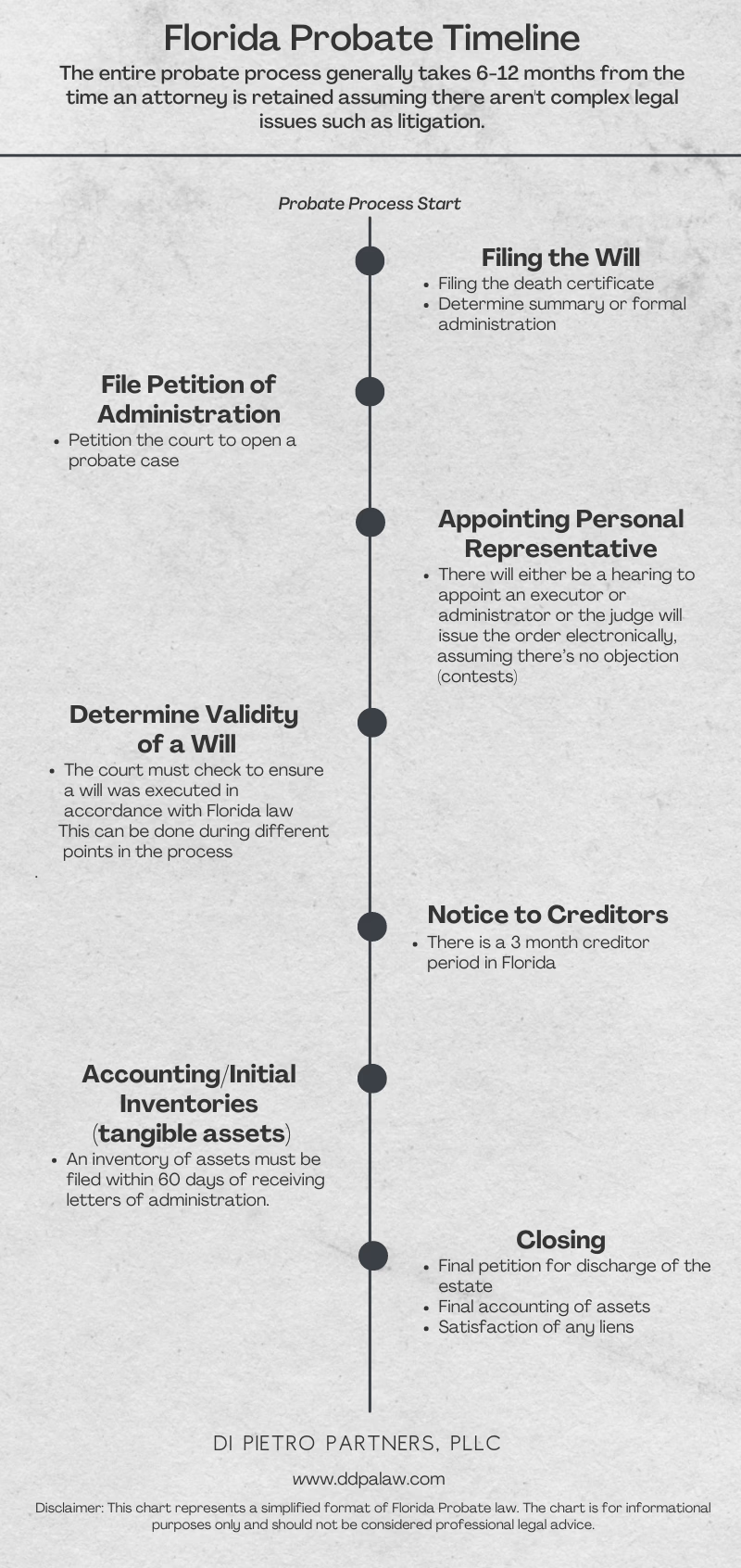Legal Grounds for Contesting an Estate | Florida Contested Wills and Estates
 Contesting an estate involves legal disputes that challenge the validity of a will or the distribution of assets from a deceased person’s estate. While wills and estate plans are intended to provide clarity and prevent disputes, conflicts can still arise due to a variety of factors, such as questions of validity, undue influence, or disagreements among beneficiaries.
Contesting an estate involves legal disputes that challenge the validity of a will or the distribution of assets from a deceased person’s estate. While wills and estate plans are intended to provide clarity and prevent disputes, conflicts can still arise due to a variety of factors, such as questions of validity, undue influence, or disagreements among beneficiaries.In Florida, contested estates are a common part of the probate process, especially given the state’s large retired population and the complexity of probate laws. These disputes often involve high stakes, as they can significantly impact inheritances, family relationships, and the distribution of assets.
Understanding the legal grounds and process for contesting an estate is essential for anyone involved in such a dispute.
What Does It Mean to Contest an Estate?
Contesting an estate is the legal process of challenging the validity of a will or disputing the distribution of a deceased person’s assets. This process typically arises when a party believes the will does not accurately reflect the decedent’s intentions, was improperly executed, or was influenced by fraud or undue pressure.
The contesting of an estate is closely tied to the probate process, which is the court-supervised procedure for distributing a person’s assets after their death. During probate, the court reviews the will, identifies heirs and beneficiaries, resolves debts, and oversees the transfer of assets. Disputes may arise at various stages of probate, especially if questions are raised about the will’s legitimacy or fairness.
The key parties involved in estate contests typically include heirs, beneficiaries, executors, and sometimes creditors. Heirs are individuals who are legally entitled to inherit if there is no valid will, while beneficiaries are specifically named in a will or trust to receive assets. Executors, also known as personal representatives, are responsible for managing the estate during probate and are often central figures in estate disputes.
Legal Grounds for Contesting a Florida Estate
Contesting an estate in Florida requires valid legal grounds to challenge the validity of a will or the distribution of assets. Below are the most common reasons an estate might be contested, along with explanations of how these issues are addressed in Florida probate law:
Lack of Testamentary Capacity – To create a valid will, the individual (testator) must possess the mental capacity to understand the nature and consequences of their actions. This includes knowing the extent of their assets, identifying their beneficiaries, and understanding how their will affects the distribution of their estate.
Undue Influence – Undue influence occurs when someone exerts excessive pressure or manipulates the testator to create or alter a will in their favor. Examples include isolating the testator from other family members, making significant changes to the will shortly before death, or exploiting a position of trust.
Fraud or Forgery – Fraud occurs when the testator is deceived into creating or altering a will, often through misrepresentation or coercion. For example, someone might falsely claim to act in the testator’s best interests while pressuring them to make specific changes. Forgery involves the intentional falsification of a will, such as forging the testator’s signature.
Failure to Meet Formalities – Florida law establishes strict requirements for a will to be considered valid. To meet these formalities, the will must be in writing and signed at the end by the testator. Additionally, the signing must be witnessed by at least two competent individuals, who must also sign the will in the testator’s presence. Failure to adhere to these legal requirements can result in the will being deemed invalid, preventing it from being admitted to probate.
The Process of Contesting an Estate in Florida

Contesting an estate in Florida involves a multi-step process that requires careful adherence to legal procedures and timelines.
1. Filing a Petition
The first step in contesting an estate is filing a formal petition in the probate court located in the county where the decedent resided. This petition outlines the grounds for the contest and requests the court to address the dispute.
Timing is critical in these cases, as Florida law imposes a statute of limitations on estate contests. Generally, you must file your challenge within 90 days of receiving notice of the probate proceedings. If no formal notice was provided, the deadline may be extended, but acting promptly is essential to preserve your rights.
2. Gathering Evidence
Once the petition is filed, gathering evidence is a crucial part of building your case. Strong documentation, credible witnesses, and expert testimony can significantly strengthen your position in an estate dispute.
Examples of evidence commonly used in these cases include medical records demonstrating lack of testamentary capacity, financial documents showing undue influence, or witness statements verifying irregularities in the will’s execution. Expert witnesses, such as handwriting analysts or medical professionals, may also provide critical insights to support your claim.
3. Mediation and Litigation
After evidence is collected, many estate disputes proceed to mediation as an attempt to resolve the matter without going to trial. Mediation is a structured negotiation process overseen by a neutral third party, which often helps parties reach a mutually agreeable resolution.
If mediation fails, the case will move to trial, where both sides present their arguments before a judge. During trial, the court examines the evidence, hears witness testimony, and ultimately makes a ruling based on Florida probate law. While litigation can be lengthy and complex, it is sometimes the only way to resolve deeply contested estate matters.
Potential Outcomes of Contesting an Estate
Contesting an estate can lead to several possible outcomes, depending on the legal grounds of the dispute and the evidence presented. Below are some common resolutions and considerations:
One potential outcome is the invalidation of the contested will, either in its entirety or in part. If the court determines that the will is invalid, an earlier valid will may be reinstated. In cases where no prior valid will exists, the estate may be distributed according to Florida’s intestacy laws, which determine heirs based on family relationships.
Another resolution could involve the redistribution of assets. For example, if undue influence or fraud is proven, the court may adjust the distribution to reflect the testator’s original intentions or to align with legal requirements.
Hiring an Experienced Florida Estate Attorney
Contesting an estate is a complex legal process that requires the guidance of a skilled attorney to ensure the best possible outcome. Whether you are a personal representative, an executor, or a beneficiary, having experienced legal representation is critical to navigating Florida’s probate laws and building a strong case.
The attorneys at Di Pietro Partners bring decades of trial experience to estate litigation cases. Our team has represented both personal representatives and beneficiaries in disputes involving contested wills, trust litigation, estate administration, and more. We are skilled at handling all aspects of estate contests, including:
- Investigating claims of undue influence, fraud, or lack of testamentary capacity.
- Collecting and presenting evidence such as witness testimony, medical records, and financial documentation.
- Negotiating favorable settlements or, when necessary, aggressively representing clients at trial.
Whether your case requires a strategic out-of-court resolution or vigorous advocacy in court, our estate litigation lawyers have the skills to guide you through every step of the process.

